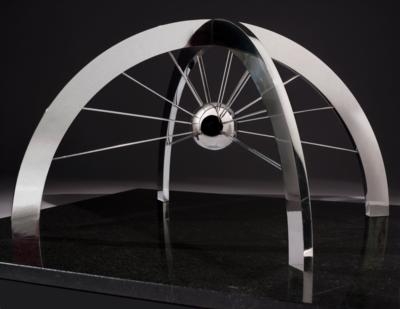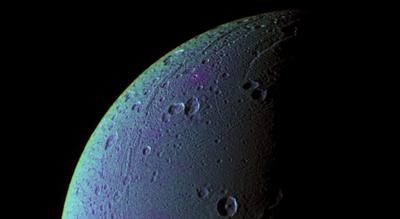Thu, Mar 15, 2012
Both Recognized For Work In The Aviation And Aerospace Fields
The Smithsonian Institute has announced the recipients of its 2012 National Air and Space Museum Lifetime Achievement and Current Achievement categories. Burt Rutan has been selected to receive the Lifetime Achievement award, while the Current Achievement trophy will go to the Cassini-Huygens Flight team. They will be presented their awards March 21 at a black-tie dinner in Washington, D.C.

"The winners of the 2012 Trophy Awards have challenged the established ways of thinking," said Gen. J.R. "Jack" Dailey, director of the museum. "Burt Rutan has inspired the aeronautical community to reach beyond the conventional for innovation and achievement; the Cassini-Huygens mission has changed our understanding of the Saturn system and contributed to our understanding of planetary systems' formation and evolution."
Established in 1985, the award recognizes outstanding achievements in the fields of aerospace science and technology and their history. As in past years, Trophy winners receive a miniature version of “The Web of Space,” a sculpture by artist John Safer (pictured).
Rutan has designed and built some of the most exciting machines ever to fly. His revolutionary lightweight, durable and efficient air- and spacecraft have broken numerous world records, including the first nonstop flight around the world without refueling (Voyager) and first privately developed reusable sub-orbital spacecraft (SpaceShipOne). To date, five Rutan aircraft are in the museum’s collections. Rutan’s companies—Rutan Aircraft Factory and Scaled Composites—have produced an eclectic range of homebuilt, research, civilian and military aircraft that have changed construction and engineering, solved specific aeronautical problems and captured the imagination of the aerospace industry and the world.

Arriving at Saturn in 2004, Cassini has been chronicling Saturn and its satellites and rings. From characterizing Saturn’s atmosphere and radiation belt, to imaging new faint rings, to detecting methane-carved stream-like drainage channels and lakes on Titan, to imaging geysers erupting from the south polar region of Enceladus, the discoveries made by this mission continue at a fantastic pace. The Cassini-Huygens team has far exceeded the planned primary mission duration and objectives, taking maximum advantage of this invaluable asset. Further, by careful management of spacecraft resources, the mission may continue for years, thus allowing the Cassini-Huygens Flight Team to answer scientific questions far beyond those conceived at the mission’s onset (Image of moon Dione from Cassini spacecraft courtesy of NASA).
More News
He Attempted To Restart The Engine Three Times. On The Third Restart Attempt, He Noticed That Flames Were Coming Out From The Right Wing Near The Fuel Cap Analysis: The pilot repor>[...]
Make Sure You NEVER Miss A New Story From Aero-News Network Do you ever feel like you never see posts from a certain person or page on Facebook or Instagram? Here’s how you c>[...]
From 2009 (YouTube Edition): Leading Air Show Performers Give Their Best Advice for Newcomers On December 6th through December 9th, the Paris Las Vegas Hotel hosted over 1,500 air >[...]
Aero Linx: NASA ASRS ASRS captures confidential reports, analyzes the resulting aviation safety data, and disseminates vital information to the aviation community. The ASRS is an i>[...]
“For our inaugural Pylon Racing Seminar in Roswell, we were thrilled to certify 60 pilots across our six closed-course pylon race classes. Not only did this year’s PRS >[...]
 NTSB Final Report: Rutan Long-EZ
NTSB Final Report: Rutan Long-EZ ANN FAQ: Turn On Post Notifications
ANN FAQ: Turn On Post Notifications Classic Aero-TV: ICAS Perspectives - Advice for New Air Show Performers
Classic Aero-TV: ICAS Perspectives - Advice for New Air Show Performers ANN's Daily Aero-Linx (06.28.25)
ANN's Daily Aero-Linx (06.28.25) Aero-News: Quote of the Day (06.28.25)
Aero-News: Quote of the Day (06.28.25)




